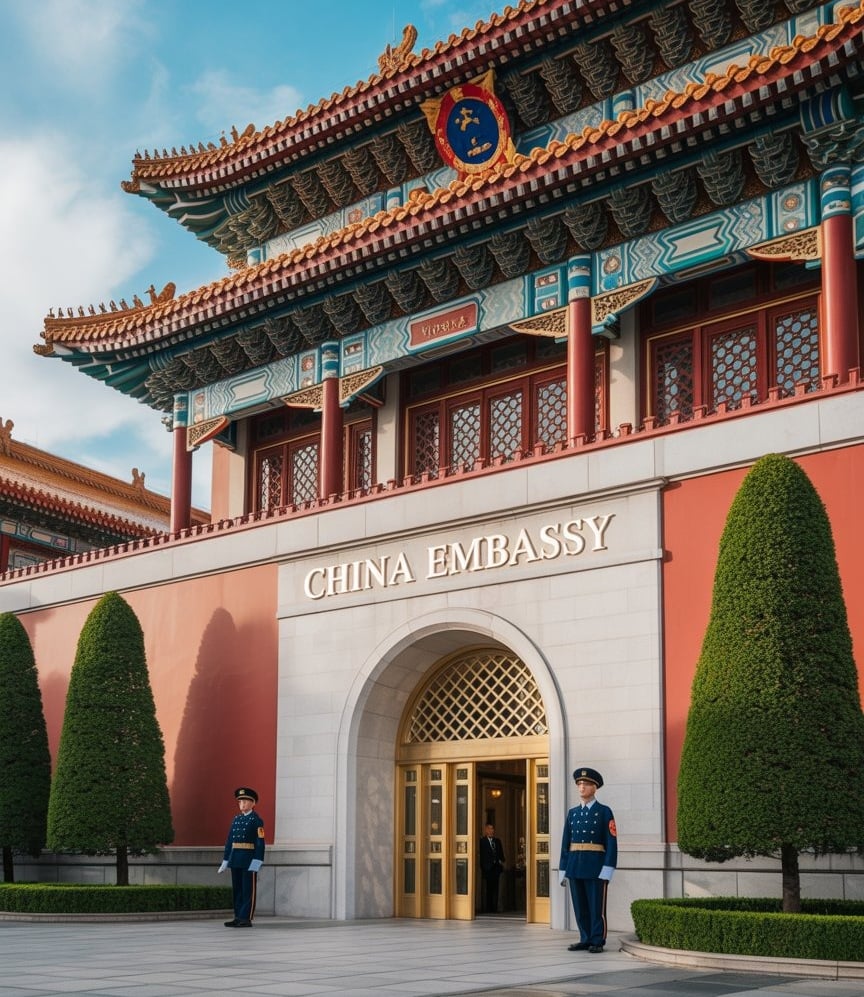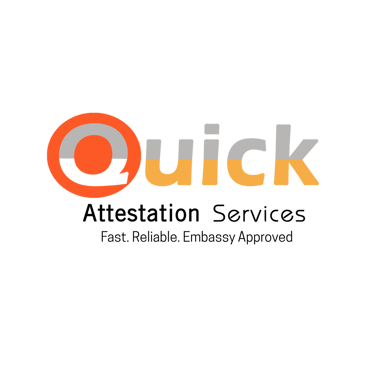China Embassy Attestation Made Easy
Discover everything you need to know about China embassy attestation, including the visa attestation process and essential tips to simplify your attestation journey.
10/22/20257 min read


Understanding Embassy Attestation
Embassy attestation represents a critical process for individuals and organizations seeking validation of their documents through foreign embassies, particularly the Chinese embassy. This procedure involves the authentication of various types of documents, including but not limited to educational certificates, business contracts, and personal identification. The primary objective of embassy attestation is to ensure that the documents are legally recognized in the host country, facilitating their use in official matters.
The process typically begins with obtaining notarization or verification of the documents from relevant local authorities. This step is crucial, as the Chinese embassy will only accept documents that have been duly verified by appropriate legal entities. Once the documents are verified, they are presented to the embassy along with a set of required forms and fees. The embassy then reviews the documents, ensuring they meet all necessary standards before issuing the attestation.
Understanding the significance of embassy attestation is essential for anyone engaged in activities that require document validation for travel, education, or business. For instance, individuals applying for a visa to China must provide attested documents to prove their qualifications, financial stability, and intent of visit. Similarly, companies looking to establish business ties in China often need to authenticate contracts and corporate documents to comply with local regulations.
Furthermore, the importance of embassy attestation extends beyond mere compliance; it also serves to enhance the credibility of documents in international dealings. The attestation process assures the relevant authorities in China of the authenticity of the documents presented, ultimately reducing the risks associated with fraud or misrepresentation. Therefore, a comprehensive understanding of this process is invaluable for both personal and professional pursuits involving the Chinese jurisdiction.
Types of Documents That Need Attestation
Attestation is a crucial process in the validation of various documents, particularly when dealing with international legal matters. The Chinese embassy requires attestation for a variety of documents to ensure authenticity and compliance with regulations. Understanding the types of documents that need attestation can help streamline the process and avoid potential delays.
One of the primary categories of documents that require attestation includes educational certificates. This group comprises diplomas, degrees, and transcripts from educational institutions. Attestation of educational documents is essential for individuals seeking employment, further education, or professional recognition in China. It validates the legitimacy of the qualifications and serves to verify the individual’s educational background.
Another important category is personal civil documents, such as marriage certificates and birth certificates. These documents often necessitate attestation when individuals are applying for residency, visas, or citizenship in China. The attestation assures the Chinese authorities of the authenticity of the personal records, which are vital for legal processes and family reunification.
Furthermore, commercial documents require attestation when dealing with trade and business transactions. These may include contracts, agreements, and company registrations. By having these documents attested, businesses can enhance their credibility, ensuring that their operations are legally recognized in China. The attestation process provides confidence in contractual obligations, protecting the interests of all parties involved.
In addition to these, other documents such as powers of attorney and affidavits may also need attestation depending on their use. This ensures that all legal and administrative actions are enforceable and recognized by the Chinese government. Attestation serves as a form of validation that promotes trust and authenticity in international dealings.
Step-by-Step Process of Attestation
The process of obtaining embassy attestation, particularly for documents related to China, can seem complicated. However, by following a clear step-by-step procedure, individuals can simplify this task significantly. The first step involves preparing the necessary documents that require attestation. This could include educational certificates, business documents, or personal identification papers. It is crucial to ensure that these documents are original, as copies will not be accepted for the attestation process.
Once the documents are compiled, the next stage is to have them notarized, if necessary. Notarization adds an extra layer of validation, confirming the authenticity of the documents before they are submitted for embassy attestation. It is advisable to check whether notarization is required for your specific documents, as certain types may not need this additional step.
The subsequent phase is submitting the notarized or original documents to the relevant authorities for verification. This often involves contacting a specific government department or agency that handles the attestation of documents. Each country may have unique procedures, so understanding local protocols is essential. It is crucial to inquire about the expected processing times when submitting the documents, as this can vary widely.
Finally, the documents are then sent to the Chinese embassy for the official attestation process. The embassy will review the documents, ensuring that all previous steps have been correctly followed. Keep in mind that each embassy may have its own set of guidelines and timelines for processing. To avoid potential pitfalls, it is recommended to double-check all requirements and seek assistance if uncertainties arise. This proactive approach can help ensure a smoother overall experience.
Common Challenges and How to Overcome Them
When navigating the China Embassy attestation process, individuals may encounter several challenges that could complicate their efforts. One of the most common issues is the submission of improper document formats. Each document must adhere to specific guidelines, including proper notary services and translation standards. To overcome this obstacle, it is advisable to meticulously review the required formats listed on the embassy's official website prior to submission. Consulting with professionals who specialize in attestation can also provide valuable insights into ensuring compliance with necessary standards.
Another prevalent challenge is delays in processing times. Various factors, such as high application volumes or administrative changes at the embassy, can lead to unexpected hold-ups. To address this, applicants should be proactive in tracking their application status. Utilizing the embassy's online tracking tools, if available, or establishing direct communication with the consular staff can offer clarity on expected timelines. Moreover, submitting applications well in advance—particularly for time-sensitive documents—can mitigate the impact of potential delays.
Confusion regarding specific requirements is yet another hurdle that many face. The attestation process can be intricate, with varying requirements based on the purpose of the document. To navigate this effectively, individuals should gather as much information as possible from credible sources. Engaging with a professional attestation agency may also provide tailored guidance that simplifies the process. When in doubt, contacting the embassy for clarification on any ambiguous requirements is a prudent step to ensure all conditions are met.
By understanding these common challenges and implementing proactive strategies, individuals can enhance their experience with the China Embassy attestation process, making it more efficient and less stressful.
Cost and Timeframe of the Attestation Process
The attestation process for documents intended for use in China entails several costs and time considerations that individuals should be aware of. The overall expenses can be divided into government fees, service charges, and any potential additional costs related to document procurement or expedited processing. Government fees vary depending on the type of document being attested. For example, personal documents such as marriage certificates, birth certificates, or educational degrees generally incur a different fee structure compared to commercial documents. It is advisable to check the specific fees associated with each type of document on the official website of the embassy or consulate.
In addition to the direct government fees, service charges from notary services or document management companies may also apply. These charges can vary significantly based on the complexity of your requirements, geographical location, and the reputation of the service provider. It is prudent to obtain a few quotes from different service firms to ensure competitive pricing and to clarify what services are included in the fee.
Regarding the timeframe for the attestation process, this can fluctuate based on several factors, including the type of document, whether all relevant information is provided accurately, and the processing load at the embassy or consulate. Typically, the attestation process may take anywhere from a few days to several weeks. For example, straightforward documents such as educational certificates might be processed faster than more complex commercial contracts. Individuals seeking to expedite the procedure may have options available for urgent processing, though this will likely incur additional costs. Carefully planning for both costs and timeframes will assist in mitigating unexpected delays and exceeding budget constraints during the attestation journey.
Alternative Options for Document Verification
When traditional embassy attestation appears complex or time-consuming, individuals and businesses can consider several alternative avenues for document verification. These options may provide a more streamlined process, depending on specific needs and circumstances. Among the most common alternatives are third-party verification services, online verification platforms, and apostille services.
Third-party verification agencies have become increasingly popular for their ability to manage the document verification process efficiently. These agencies often possess the necessary expertise and industry knowledge to navigate bureaucratic hurdles associated with embassy attestation. They typically offer comprehensive packages that include the review, notarization, and submission of documents, thereby relieving clients from the burdensome administrative tasks. However, reliance on third-party services can introduce additional costs and potential risks related to the quality and reliability of the service provided.
Online verification platforms represent another modern alternative for document verification. These platforms enable users to upload documents for verification without the need for in-person visits to embassies or agencies. This method often features a faster turnaround time, which can be particularly beneficial for time-sensitive documents. Nevertheless, users should proceed with caution, ensuring that any online service adheres to stringent security measures to protect personal information.
Apostille services are also a viable option in certain situations. An apostille is a form of international certification provided under the Hague Convention, which simplifies the legalization of documents by omitting the need for embassy attestation in some countries. It's crucial to verify whether the destination country is a member of the Hague Convention before opting for this solution. Apostille services can enhance convenience but may not be applicable for all types of documents or jurisdictions.
Ultimately, each of these alternative options presents unique benefits and drawbacks. Evaluating the specific context of document usage will guide individuals and businesses in selecting the most appropriate verification method.
Tips for a Smooth Attestation Experience
To achieve a seamless attestation experience at the China embassy, thorough preparation and careful planning are essential. One of the foremost steps is to ensure that all documents required for attestation are collected and verified well in advance. This preparation includes checking the list of necessary documents, which typically comprises original certificates, copies, and, if applicable, any supporting documents that may strengthen the application. Proper organization of these materials can significantly reduce wait times and potential issues during your visit to the embassy.
Choosing the right service provider is another critical aspect in the attestation procedure. There are numerous agencies that specialize in document attestation, and selecting a reputable one can alleviate much of the stress involved. Researching service providers by looking at reviews and their timeframe for processing applications can help streamline the process. Some agencies also offer additional support, such as document translation services or legal assistance, which could be beneficial depending on your specific needs.
Maintaining open communication with the embassy is potentially one of the most crucial factors for a smooth attestation experience. Before your visit, it is advisable to contact the embassy to clarify any uncertainties regarding requirements or procedures. This proactive approach can prevent misunderstanding and ensure that you arrive fully prepared. Additionally, inquire about the typical processing times to manage your expectations and plan accordingly.
Lastly, conducting thorough research on the attestation process, including potential timelines and costs, is vital to avoid unforeseen complications. Being informed about the procedure can assist you in making educated decisions and effectively managing the overall time frame. Preparation and knowledge contribute significantly to ensuring that the embassy attestation experience is both efficient and straightforward, ultimately saving both time and effort.
